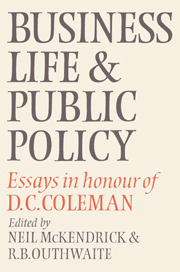Book contents
- Frontmatter
- Contents
- Preface
- List of contributors
- 1 Piscatorial politics in the early Parliaments of Elizabeth I
- 2 Marriage as business: opinions on the rise in aristocratic bridal portions in early modern England
- 3 Age and accumulation in the London business community, 1665–1720
- 4 The use and abuse of credit in eighteenth-century England
- 5 Convicts, commerce and sovereignty: the forces behind the early settlement of Australia
- 6 ‘Gentleman and Players’ revisited: the gentlemanly ideal, the business ideal and the professional ideal in English literary culture
- 7 The City, entrepreneurship and insurance: two pioneers in invisible exports – the Phoenix Fire Office and the Royal of Liverpool, 1800–90
- 8 ‘At the head of all the new professions’: the engineer in Victorian society
- 9 Bernard Shaw, Bertold Brecht and the businessman in literature
- 10 Lost opportunities: British business and businessmen during the First World War
- 11 Ideology or pragmatism? The nationalization of coal, 1916–46
- Bibliography of D. C. Coleman's published works
- Index
9 - Bernard Shaw, Bertold Brecht and the businessman in literature
Published online by Cambridge University Press: 07 October 2009
- Frontmatter
- Contents
- Preface
- List of contributors
- 1 Piscatorial politics in the early Parliaments of Elizabeth I
- 2 Marriage as business: opinions on the rise in aristocratic bridal portions in early modern England
- 3 Age and accumulation in the London business community, 1665–1720
- 4 The use and abuse of credit in eighteenth-century England
- 5 Convicts, commerce and sovereignty: the forces behind the early settlement of Australia
- 6 ‘Gentleman and Players’ revisited: the gentlemanly ideal, the business ideal and the professional ideal in English literary culture
- 7 The City, entrepreneurship and insurance: two pioneers in invisible exports – the Phoenix Fire Office and the Royal of Liverpool, 1800–90
- 8 ‘At the head of all the new professions’: the engineer in Victorian society
- 9 Bernard Shaw, Bertold Brecht and the businessman in literature
- 10 Lost opportunities: British business and businessmen during the First World War
- 11 Ideology or pragmatism? The nationalization of coal, 1916–46
- Bibliography of D. C. Coleman's published works
- Index
Summary
The cultural context of business activity is a time-honoured theme in the study of economic and social history. A vast and varied literature on this subject has emerged, ranging from the celebrated essay published by Max Weber in 1905 on The Protestant Ethic and the Spirit of Capitalism to R. H. Tawney's Religion and the Rise of Capitalism (1926) and to more recent sociological explorations of attitudes to entrepreneurship and profit-making. Most such works are concerned with general perceptions of wealth and the wealthy rather than with the ways businessmen themselves have reflected on their careers and their place in society. But recently there has been an upsurge in interest in business history, in part stimulated by the publication of a number of widely respected histories of firms, such as Donald Coleman's three-volume account of Courtaulds, or of biographies of men of wealth, such as Gerson Bleichröder, Bismarck's banker and confidant. As a result, it has become possible to broaden our understanding both of the process of wealth-creation and of the multiple meanings given to it by different generations in different societies.
Even a cursory glance at a fraction of the writings of critics and defenders of businessmen in the past century and a half of English (let alone European) history will suffice to warn the reader against any single interpretation of attitudes to entrepreneurship and commerce.And yet one historian recently has had the courage to cut through theknot of scholarly caution to offer a distinctive reading of English cultural history with respect to business activity.
- Type
- Chapter
- Information
- Business Life and Public PolicyEssays in Honour of D. C. Coleman, pp. 185 - 204Publisher: Cambridge University PressPrint publication year: 1986



